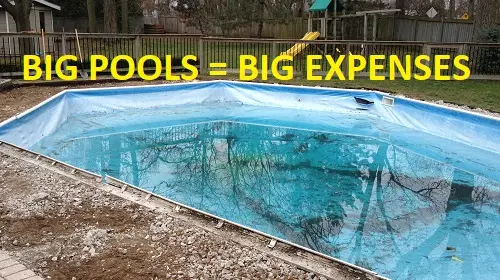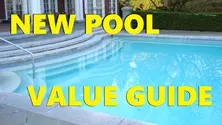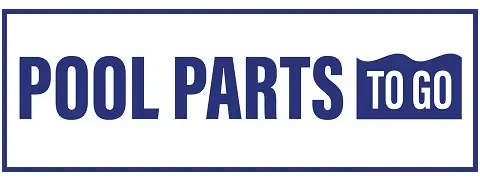Benefits Of Small Swimming Pools
SwimmingPoolSteve.com is user-supported. In order to keep this resource about pools and spas available for free to all readers I earn commissions for purchases made through links on this page. For more information see the full disclaimer page. By using this website you are agreeing to the terms and conditions.

If you are wondering about the value in choosing a large swimming pool versus a small swimming pool then you simply need to look at the automotive industry to see a reflection of the swimming pool industry. It used to be common a few decades ago that you should build the largest swimming pool that your backyard can accommodate. I mean why would you build a small swimming pool when you can have a gigantic 40,000 gallon monster pool? The answer to that, like the answer to many swimming pool questions, is money. Sprinkle in a general decline in residential property sizes as urban areas develop to maximize space and you start to see that small pools are not just a good idea, they are the majority of the pools being installed these days.
Hardly anyone has the space to put in a 20x40' any longer, and don't forget the three feet of concrete deck on all sides and now this pool takes up a minimum footprint of 26' x 46' which is huge. That is the length of a full size school bus with room to walk around on both ends. So do you really need this much pool to enjoy swimming in your backyard? Not a chance. Not only is the larger pool more expensive to buy, it is impractical in every way to own and operate, and less desirable to swim in due to massive heating costs for so much water. A small pool provides a ton of strategic advantage if you know what to look for. Let's crunch some numbers on heating because this is one of the biggest problems with large pools and biggest advantages to small pools.

A large 20x40' with a 10' deep end might come in just shy of 40,000 gallons so let's use that as the comparable metric. To this let's look at a 12'x24' pool with a 6' deep end. This pool we will assume to be around 9700 gallons. Right away you can see the huge difference in volume. The larger pool actually holds four times as much water as the smaller pool. When looking at BTU you consider the weight of the water, and if you multiply the gallons by 8.3 this will tell you how may BTU's are needed to raise the water by one degree. Now, let's assume the water is 65F (18C) degrees and we want to swim at a respectable 82F (28C). So that is 17 degrees Fahrenheit we need to increase the water.
Small pool heating
9700 x 8.3 x 17 = 1,368,670 BTU's
Large pool heating
40,000 x 8.3 x 17 = 5,644,000 BTU's
Not only does it take so much more money to increase the initial temperature, but you have to also consider that a pool with a larger surface area will lose heat more readily than a pool with a smaller surface area. This is really where the cost difference starts to add up. It takes a ton of time, and money to heat the pool up, and the heat losses due to evaporation compound this. It costs more than four times as much to heat a pool four times as large. This alone is enough reason to get a smaller pool for most swimming pool shoppers. Some people do not mind swimming in cold(er) water but there is also a huge segment of pool owners who simply do not go in until the water is in the mid 80's (30C) or higher. With a large pool this will be prohibitively expensive to most pool owners.
What is the #1 thing pool owners would do different next time - After a lifetime in the pool industry you start to be able to see the patterns emerge and one that is easily visible to me is that pool owners often lament the size of the shallow end of the pool. There is time to jump in the pool and there is a time for swimming / treading water but after you have owned a pool for a while you realize that the majority of your time in the pool is spent standing, playing games or hanging out / lounging on the steps and benches. This makes the shallow area of your pool by far the main hangout spot. This means the smallest area of your pool is the prime area where everyone spends their time. The number one complaint from new swimming pool owners that I hear is that they wish they had made the shallow end larger, or potentially put in a "sport pool" which has a shallow end on both sides with a deeper section in the middle.
How deep should a pool be for swimming? - Jumping in is a different story that I generally answer by saying pools are too shallow for big jumps, diving boards, jumping rocks and things like this. However I definitely want a pool that is deep enough to swim comfortably in. The ideal pool depth for treading water is simply whatever height you are. If you are six feet tall then a pool with a six foot finished depth in the deep end is deep enough that you do not skim the bottom with your feet while you are treading water. Since you keep your mouth and nose above water level, a pool as deep as you are tall is perfect for treading water and having a few inches of space under your feet.
Ledges, steps and benches...Oh My! - If you are installing a smaller swimming pool already, which would be anything in the 12x24' to 16x32' range, you should be very selective about the features that you add that will encroach on your swimming and playing area. Already with a small pool the fun is packed into a pretty tight space. Something like a baja or lounge ledge in your pool could take up 30% of the swimming room that you have. Do you really think you will spend that much time on the ledge? Does the pool also have benches and liner over steel steps which also are within the interior of the pool? All of these features add to the expense budget for this pool and ultimately are taking away of the open swimming space, of which you really do want as much as your pool size can afford. I am not saying to skip on features that you want for your pool, but more suggesting that you should be very critical of the upgrades that you add and only add ones that you really have a high expectation of use for.

Aside from these considerations it is also important to understand that a large pool with more volume also needs more chlorine than a small pool. A larger pool cover. Bigger pumps and filters are also needed and all of this adds up in more ways than just the initial installation costs. This also means that at every major renovation point or repair point your bill will be more expensive for the larger pool, and when there is a 250% increase in chlorine costs within a short period of time, you will feel this a lot more with the larger pools.
Small pools are easier to care for and vacuum, the pool cover weighs less and costs less and these are great features especially if you intend to take care of your own swimming pool especially. Every purchase you make for a small pool from equipment to covers to chemicals would cost you more if you were to have a larger pool.
Cons of small swimming pools - To provide a counterpoint to the small pool question the first con is that you can not really jump in small pools, and you absolutely should never dive into them. If that is one of your main goals of getting a pool then you need to think larger, literally. Small pools also suffer from the problem that there is a lack of professional quality pool equipment options for small pools. Around 10,000 gallons is the point where most manufacturers start to provide options. For example, if you have a 5000 gallon pool and you want a salt chlorine system, then there are none to choose from. Everything on the market is made for larger pools and trying to use equipment that is too large (like pumps or salt chlorine systems) is inconvenient at best and can actually be dangerous at worst. Pool pumps especially are like this and there are very few quality pumps under one horsepower, so if you have a pool under 10,000 gallons most of the pool pumps will be well oversized for your needs. These problems can be mostly mitigated by designing the pool to be safe for the amount of flow your filtration system generates, and by choosing a suitably modest pump size. There may only be a few options in this smaller pump size but you only need one pump. As a final note, if you are a lap / length swimmer then short pools are not great but remember there are also swim jet systems (and tethers) that you can install to help with length or exercise swimming.
As with most questions in the swimming pool industry there is no right or wrong answer. There is only a calculation of cost versus expectation of function which really comes down to individual preferences. What is right for you and your pool might not be right for your neighbor, but in general small pools are on the rise, and they are a cost efficient way to get your family swimming.
Top content from www.SwimmingPoolSteve.com
Pool and spa chemistry crash course
New pool owner guide
The Swimming Pool Steve blog
Have a question - ask Steve

Swimming Pool Steve is an award winning, second generation swimming pool specialist from Ontario Canada and one of the most trusted voices in the swimming pool industry. With over 20,000,000 views on the Swimming Pool Steve YouTube Channel, winner of the Pleatco Pool & Spa Industry Leadership award and author of hundreds of pool and spa articles both online and in print. Steve is committed to helping pool and spa owners as well as pool and spa industry workers learn more about the technical side of building, renovating, repairing and maintaining all types of swimming pools and spas. Follow Swimming Pool Steve on Facebook, Twitter and YouTube.
Paid PDF Books From Swimming Pool Steve
 Steve's Pool Survival Guide
Steve's Pool Survival Guide
The Swimming Pool Steve Pool Survival Guide is intended to help pool owners understand their pool and pool equipment better, understand water chemistry, water testing and chemical corrections to the water, troubleshoot the most common pool problems and have confidence in interacting and caring for their pool in the fastest possible frame of time. Also covers pool safety, things to avoid and how to operate your pool more efficiently.
 New Pool Installation Value Guide
New Pool Installation Value Guide
This is a value shopping guide written by Swimming Pool Steve to help home owners hiring for a new pool installation to get the maximum value for their investment with tips about how to protect your interests during the vetting, hiring and pool installation process. Anyone serious about having a pool installed will find value in this guide. Pool installers will sell the pool package that is best for them - not for you! Become an informed value shopper with this PDF guide.
Endorsed Brands From Swimming Pool Steve
The following links and products are to affiliates of the Swimming Pool Steve website. These are brands, products and services hand selected by Steve for endorsement. Please note that these endorsements can include monetary compensation, affiliate links and referral fees to Swimming Pool Steve, however there is zero additional cost to you should you use one of these products or services. Income generated from these links helps to keep this pool and spa resource available for everyone. To have your product or service considered for listing here as an endorsed brand email SwimmingPoolSteve@gmail.com.
Amazon Disclosure Statement - As an Amazon Associate I earn from qualifying purchases.

www.PoolPartsToGo.com
New Black + Decker variable speed pumps are available online from www.PoolPartsToGo.com and they are a drop in replacement for many popular pump models including Pentair Superflo and Hayward Super Pumps. With an adjustable platform base, union connections included and a very strong warranty these pumps offer an impressive value to pool owners.
- Swimming Pool Steve